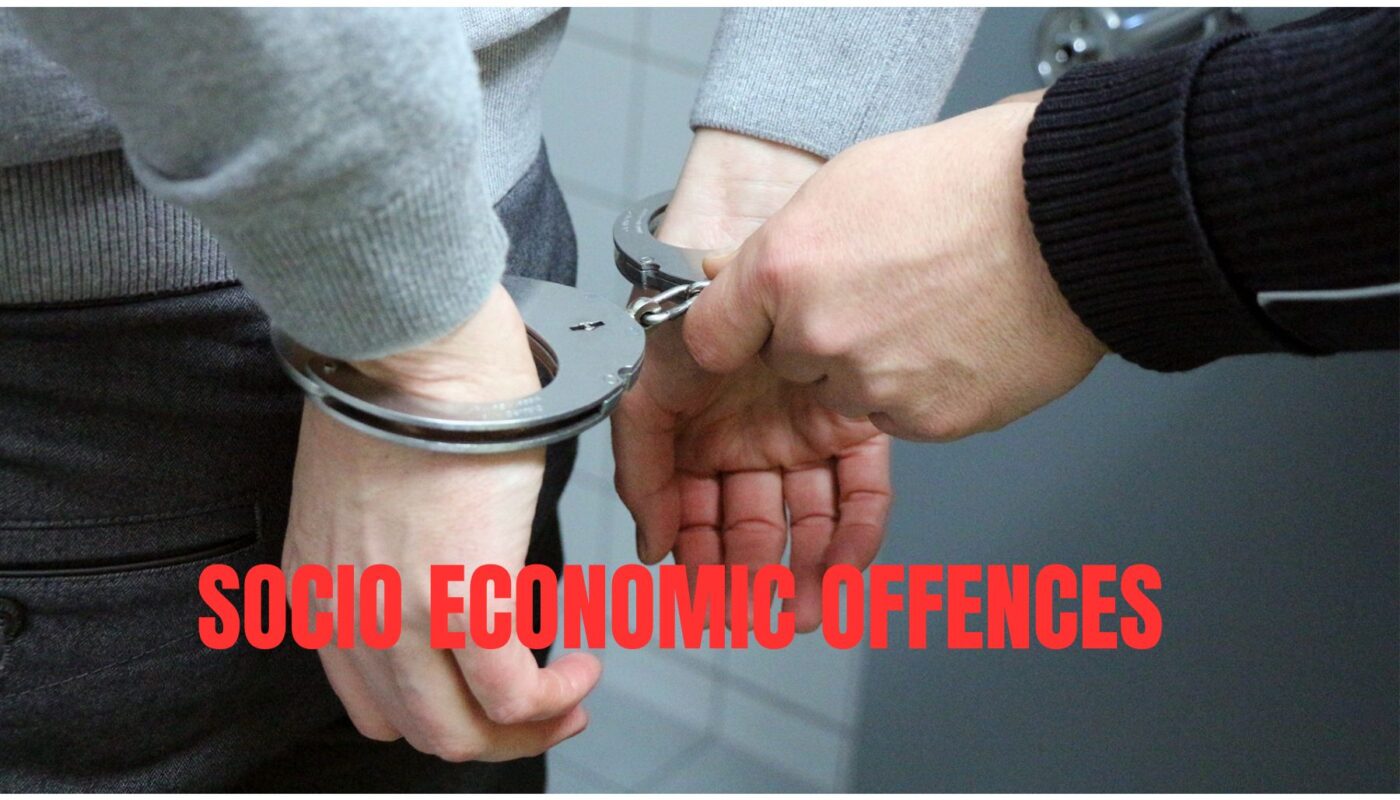Definition and nature of socio-economic offences in India
The idea of socio-economic offences in India outlined in India’s 47th Law Commission Report is critical. According to the study, socioeconomic crimes are social offences that have an impact on the health, morals, social, or overall well-being of the community as a whole, rather than just the individual victim. Economic offences are those that are harmful to society’s economy and endanger not only individual money but the entire economic structure of a country.
Broader scope of socio-economic offence: White-collar crimes are perpetrated by members of the affluent and well-to-do classes. A socioeconomic offence, on the other hand, maybe committed by anybody. Socio-economic offences not only broaden the scope of white-collar crime as understood by Sutherland and acknowledged by others, but also have broader implications.
The Dichotomy of Socioeconomic Crimes and Traditional Offenses: Socio-economic crimes differ from traditional crimes because they do not, to a common mind, involve or carry with them any stigma, while traditional crimes, unlike the socio-economic crimes have a symbolic meaning for the public and carry stigma involving a disgrace, depravity, and immorality and are thought of as decidedly the behavior of the lower class of people.
Impact Beyond Individuals: Usually, in these types of offences, the victim is mainly public at large, especially the consuming public, and even if there is no harm to any particular person, the harm is caused to the society which has a very large impact upon the society.
Mens Rea Variations in Socioeconomic and Conventional Offenses: In the case of conventional offences, culpability is not absolute and is rather connected to the wrongdoer’s intent. However, in the case of socio-economic offences, the government has a propensity to reduce the need for mens rea for criminal responsibility.
Beyond Ordinary Harm: The harm caused by these offences is higher than that caused by ordinary crimes. They harm the morals, health, and welfare of the population as a whole, and they have the potential to destroy the economic fabric. As a result, the legislature’s policy in such instances is not to be indulgent in terms of prevention, control, and punishment, and the perpetrator is not permitted to go unpunished.
Reformative Measures vs. Deterrent Punishments: Traditional crimes were thought to be the result of the wrongdoer’s physical, environmental, or sociological maladjustments. As a result, in such situations, reformative efforts must also be made; on the contrary, socioeconomic crime is the result of hunger for money rather than any maladjustment. As a result, in these situations, harsh and frightening punishment is seen as acceptable, and reformer initiatives are not implemented.
The Santhanam Committee Report, 1964: The Santhanam Committee on Corruption, established in 1964, merited recognition for its extensive investigation work and recommended report. The committee’s name, Ministers, members of Parliament, and state legislatures were expressly mentioned in his code of behavior for anyone in positions of power, authority, or trust in our society. There should be no use of position for personal or family gain, no activities driven by party, religion, caste, or community concerns, and no unofficial dealings with businessmen or hospitality or gifts taken from them or other private individuals.
Later, in the 47th Law Commission Report, a new composite category of socio-economic offences was established. The three primary types are unlawful economic operations, illegal commercial and related transactions, and avoidance of public taxes or monetary responsibilities. The notion of socio-economic crimes is highly significant in the Report, and the prominent aspects of these violations are explored in detail.
Features of socio-economic offences
Motive: Unlike traditional crimes, the act of committing the crime is motivated by extreme greed or a desire for riches.
Emotion: Whereas typical crimes are committed for emotional reasons, these sorts of offences have no emotional basis or relationship between the victim and the perpetrator.
Target victim: In most cases, the victim is the state or a group of individuals, most notably those who are consumers of particular goods or services, shareholders or holders of other assets, and so on.
Mode of operation: The primary motivator for committing such a crime is deception, not coercion.
Mental element: Such offences are generally committed on purpose.
Protected interest: The preservation of individual members’ property, money, or health, as well as national resources, as well as the broader economic system as a whole, from exploitation or waste by people or organizations, is a social interest.
Social interest in increasing the country’s wealth through implementing rules governing taxes and dues, foreign exchanges, international business, and the like.
Different Types of Socio-Economic Offences in India
Socio-economic offences in India encompass a broad range of illegal activities that have both social and economic implications. These offences not only hinder the country’s economic development but also undermine its social fabric. The Law Commission of India, in its 29th and 47th reports, categorized these offences into various groups to better understand and address them. Here’s a brief overview of the different types of socio-economic offences as outlined in these reports:
Offences Impeding Economic Development: This category includes crimes that directly obstruct the country’s economic progress, posing a threat to its economic health. Examples could include large-scale frauds, financial scams and activities that disrupt market stability.
Tax Evasion: This category encompasses offences related to the evasion of taxes, which deprive the government of essential revenue needed for public services and infrastructure development. It includes underreporting income, falsifying deductions and smuggling to avoid customs duties.
Misuse of Public Office: Offences in this category involve public servants abusing their positions for personal gain. This can include bribery, corruption and nepotism, which erode public trust in government institutions.
Breach of Contracts and Specifications: This category covers offences similar to breaches of contract, resulting in the delivery of goods that do not meet specified standards. This can affect consumer safety and market integrity.
Hoarding and Black Marketing: These offences involve the illegal stockpiling and selling of goods at inflated prices, often during shortages or crises. This can lead to artificial scarcity and exploitation of consumers.
Adulteration of Food and Drugs: This category includes crimes related to the contamination or dilution of food and pharmaceutical products, which can pose severe health risks to the public.
Theft and Misappropriation of Public Property: Offences in this category involve the illegal appropriation or theft of government assets and funds, which can significantly impact public resources and services.
Trafficking in Licenses and Permits: This category encompasses offences related to the illegal trade or manipulation of licenses and permits, often to bypass regulations or gain undue advantages in various sectors.
Addressing these socio-economic offences is crucial for ensuring the country’s overall development and maintaining social justice. Effective legal frameworks, robust enforcement mechanisms and public awareness are essential to combat these crimes and protect the nation’s economic and social well-being.
Causes of socio-economic offences
Industrial revolution: The transition from an agricultural to an industrialized country brought about changes in the country, which resulted in offences shifting their pace from traditional to these new ones.
Post-World War II: Post-war conditions in the countries were deplorable, resulting in alterations in the regular functioning of society. As a result, new practices gave rise to new offences.
Business Competition: When new firms began to develop in the country, it generated a sense of intense competition among them. Everyone wanted to outdo each other in any way possible.
Technology: One of the factors that influenced our country’s preference for beer is also to blame for such offences. The rise of technology and scientific advancements has resulted in a decline in faith in the almighty.
Decline in Morality: As people’s dread of the ultimate judgment or the world beyond all humanly things faded, so did their morals and ethics. As a result, there has been a rise in deception and greed and thirst for worldly satisfaction.
Laissez-faire: The state opted to leave things alone, and the absence of public discontent resulted in serious consequences that are now visible in our country. However, with appropriate research and attention, these crimes in the country may be controlled.
Absence of Strong Public Outcry: Without strong public outrage and coordinated efforts to address socio-economic issues, these offences can continue unchecked.
Laws to combat socio-economic offences in India
Several Acts dealing with socio-economic offences were established to punish offenders. Furthermore, these Acts are formed to preserve the normal operations of commerce, contracts, and so on, and to allow them to take place without or with the least amount of malpractices. Among these Acts are:
The Drugs and Cosmetic Act, 1940
The Prevention of Food Adulteration Act, 1954
The Foreign Exchange Regulation Act, 1947
The Wealth Tax Act, 1957
The Income- Tax Act, 1961
The Essential Commodities Act, 1955
The Customs Act, 1962
Dowry Prohibition Act, 1961
The Prevention of Corruption Act, 1988, etc.
Difference Between Socio-Economic Offences and White-Collar Crimes
Socio-economic offences and white-collar crimes are two categories of criminal activities, each with distinct characteristics. White-collar crimes are typically committed by individuals in higher social or economic positions, often in the course of their employment. These crimes are usually non-violent and involve deceit, fraud or breach of trust. Examples include insider trading, embezzlement and corporate fraud.
On the other hand, socio-economic offences encompass a broader range of activities that impact both the social and economic fabric of society. These offences can include white-collar crimes but also extend to activities like tax evasion, hoarding, black marketing and adulteration of food and drugs, which may not always be committed by individuals in high social or economic positions.
In essence, while all white-collar crimes can be considered socio-economic offences due to their impact on the economy and society, not all socio-economic offences fall into the category of white-collar crime. The distinction lies in the social or economic status of the perpetrator and the nature of the offence.




Hi, this is a comment.
To get started with moderating, editing, and deleting comments, please visit the Comments screen in the dashboard.
Commenter avatars come from Gravatar.
I抣l right away grab your rss as I can’t find your e-mail subscription link or e-newsletter service. Do you’ve any? Please let me know in order that I could subscribe. Thanks.